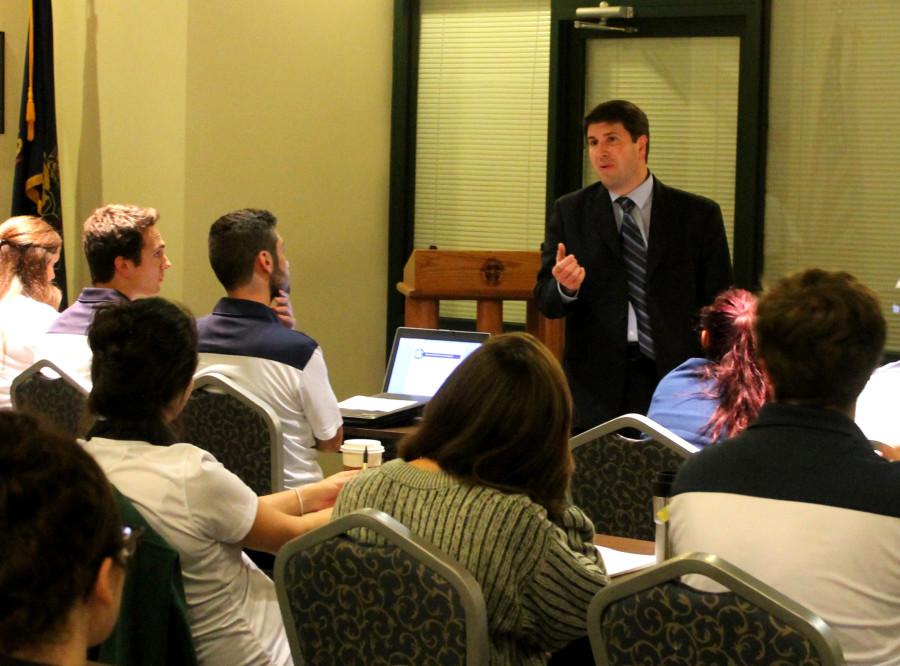New academic calendar to take effect fall 2016
David Dausey, Ph.D., addresses Mercyhurst Student Government about calendar changes.
September 29, 2015
In 2013, Mercyhurst changed from a trimester system to the current 4-1-4 system with two 14-week semesters and J-term. In the fall of 2016, the academic calendar will see another change.
“The rumors are true. We are changing it,” David Dausey, Ph.D., provost and vice president of academic affairs, said.
“Mercyhurst will move to a straight semester system with no J-term but we will offer mini semester courses,” Dausey said. The logistics of the new calendar are still being finalized. Each semester will be about 15 to16 weeks with seven-to-eight week mini-semesters within each semester. Currently, the university follows a 14-week semester system with a three-weekJanuary term.
“It is a fairly common program and growing in interest. It really is a semester system with half-semester choices,” said Dausey. Larger universities such as Elon University and Carnegie Mellon currently follow the same scheduling model.
“We are the only one [university] in this area doing this and we think this is a selling point,” Dausey said.
Under the new system, class times will be slightly shorter for semester-long courses and mini semester courses will differ in class time depending on the number of credits the course is worth. Mini-semester courses may be worth one, two or three credits.
“The flexibility of this system is favored by students and faculty,” Dausey said.
Students will have the ability to take all semester length classes if they prefer or mix in mini-length courses. This will allow students an opportunity to have more classes in the beginning half or latter half of the semester.
“If you are an athlete, you can stagger your courses for when your sport picks up. Nothing is better than having a class be over in the middle of your other classes picking up,” Dausey said.
However, mini courses will not replace semester classes.
“Not every class can be offered as a mini. Faculty will go through workshops about what makes a good mini,” Dausey said.
Mini courses are also designed to benefit adult and non-traditional students. “We are proposing faculty teach at least one mini course a year that is offered at an alternative time [outside the typical 9 a.m. to 2 p.m. day],” Dausey said.
One of the challenges of J-term courses was the three- hour-long classes. Mini courses are designed to be innovative.
“We encourage faculty to be unique, such as having a one-hour pre-recorded lecture that students can listen to online whenever they want and then have one hour of class time,” Dausey said.
Summer classes will also be redesigned to help increase students’ access to classes and will begin in the summer of 2017.
“We are currently in discussion as to what the summer will look like. We want to make it easier to take summer courses. Don’t hold me to this but we are in discussions about offering summer courses at a lower rate,” Dausey said.
Additionally, study abroad options will be offered in the summer and year round. “There is the possibility of full semester study abroad. Our partners that we do study abroad with are more than willing to work with us on a mini and semester schedule,” Dausey said.
Mini semesters may assist with students graduating on time or even early. “We want to offer a little more flexibility for students with the core while maintaining our liberal arts feel. There may be some minis that fit into the core.” Dausey said.

